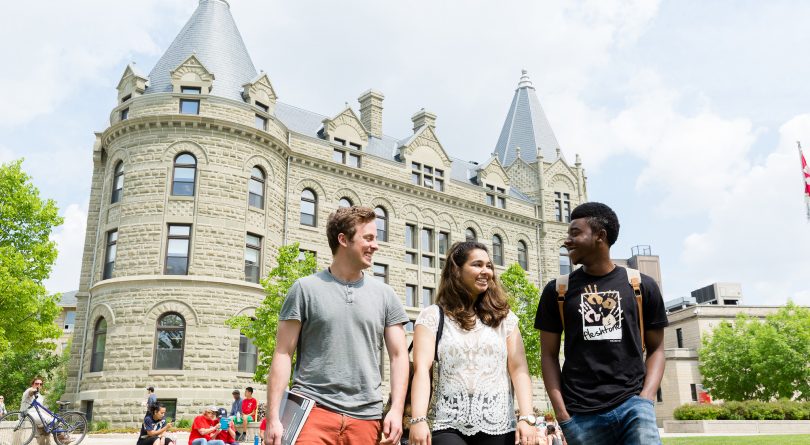Fully funded masters scholarships in Canada for international students! Canada is one of the desire study destination for international students. The reason is not far fetch from the world class education and the dynamic environment that is friendly for foreign citizens to flourish. However, study in Canada is very expenses but there are lots of funding opportunities to explore for your studies while in Canada. One of those opportunities is the call by the University of Winnipeg for application to the 16 fully funded masters’ scholarships in the department of environmental studies and Geography. This therefore offered international students in with related interests fully funded masters scholarship in Canada for their study dream.
Join our community to have access to latest scholarship and study abroad information. Join Now.
About the University of Winnipeg
The University of Winnipeg with her dynamic campus and a downtown hub that connects people from diverse cultures that nurtures global citizens. Located in Winnipeg, Manitoba Canada, the university offer high-quality undergraduate and graduate programs including several that are unique in Western Canada. University of Winnipeg is known for small class sizes, academic excellence and commitment to Indigenous inclusion. Aside these, the university has numerous fully funded masters scholarships for international students to support their studies in Canada.
About the Masters Scholarships In Canada at the University of Winnipeg
The Department of Environmental Studies and Sciences and Department of Geography at The University of Winnipeg have announced call from both local and international students for the fully funded masters scholarships to be undertaken at the university. There are 16 fully funded positions for excellent students in the following research tracks:
- Environmental Governance, Northern Development and Climate Adaptation 5 positions
- Sustainable Economy and Food Security 1 position
- Environmental Geography 2 positions
- Catchment Biochemistry 1 positions
- Assessment Of Remote Sensing And Machine Learning Technologies For Big Game Surveys 2 Positions
- Planetary Science 5 Positions
Strongly recommended for you:
- Cheap colleges in Canada for international students
- Postgraduate Scholarships in New Zealand at University of Waikato
- Lists of Scholarships in Australia for International Students
- Countries to Study for Free in Europe as an International Student
- Graduate Scholarships in Canada for international students
- Study Abroad loan for international students
The 16 Fully Funded Masters Scholarships in Canada
Track 1: Environmental Governance, Northern Development And Climate Adaptation Funded Masters Scholarships in Canada
Research Project 1: Indigenous-led Community Engagement and Assessment for Rural, Northern and Remote Development 2 positions masters scholarships in Canada
Description of project masters scholarships in Canada
The project is aimed at developing an integrated community and economic development readiness assessment tool designed with, for and by Indigenous communities. Working with rural and remote community partners, the university seek two Master’s students who will help design and facilitate participatory community engagement processes to assess related areas of critical importance, such as infrastructure, food security, health and education, and sovereign wealth creation.
Eligibility
- Students must be eligible to enroll full-time in the Master in Environmental & Social Change program at The University of Winnipeg (MA or MEnv) starting September 2022.
- The successful candidates for the masters scholarships in Canada will:
- examine how assessments are conducted by Indigenous communities, identifying effective tools, recommended practices and key challenges;
- work with community representatives to design, develop and revise enhanced community assessment tools; and;
- co-develop and document customized community engagement practices. The outcome of this project will be customized community assessment tools and processes that are tailored for and respectful of Indigenous communities and cultures. masters scholarships in Canada
Qualifications and support
- Successful candidates will have a 4-year bachelor’s degree (honours preferred) in Environmental Studies/Science, Environmental Resource Mgt., Geography, Indigenous Studies, Northern or Rural Studies, or related field, a track record of academic excellence, strong English writing skills, and be committed to teamwork.
- Experience working with Indigenous communities and/or participatory community-based research is strongly preferred.
- Experience with Geographic Information Systems is also an asset.
- Successful candidates will receive a minimum of $20,000/year for two years and be eligible to access supports for direct costs of research and conference participation.
Method of Application
Serious applicants should email Dr. Ryan Bullock (r.bullock@uwinnipeg.ca) with:
- an updated CV,
- transcripts (unofficial acceptable at this time),
- a research writing sample (e.g., major paper or senior undergraduate thesis), and
- a brief statement of interest in the above-described research project, research team and MESC program.
Research Project 2: A First Nation Capacity Enhancement in Forest Land Governance masters scholarships in Canada
Description of project
Canada’s Indigenous forest communities must be able to conserve ecosystems, be adaptive amid forces of economic restructuring, and address conflict to support local wellbeing. Conventional governance and development systems often erode community resilience by removing benefits and creating local disparity and instability. Proven approaches needed to support constructive interactions remain largely undefined and those that exist need to be shared more widely.
Eligibility
The university therefore seek one dedicated Master student who will be eligible to enroll in the Master of Environmental & Social Change program at The University of Winnipeg (MEnv or MA) starting September 2022.
The successful candidate will help:
- examine how First Nations and settler Canadian relations can be improved through forest governance models that produce sustainable benefits and support economic, cultural and ecological priorities;
- develop First Nation university capacity building initiatives, benefits, and participation needed to respond to shifting sectoral and societal demands in forest governance, and;
- mobilize different knowledges among forestry professionals, youth, Elders and university researchers and students.
Qualifications and support
- The successful candidate will have a 4-year Bachelor degree (honours preferred) in Environmental Studies/Science, Environmental Resource Mgt., Forestry, Geography, Indigenous Studies, or a related field.
- Previous experience working with Indigenous communities is a definite asset, as is experience with Geographic Information Systems.
- The successful candidate will have a track record of academic excellence and strong English writing skills.
- The successful candidate will receive a minimum of $18,500/year in funding support for two years and be eligible to access supports for direct costs of research and conference participation.
- The incoming team member will join the Environment & Society Research Group.
Method of Application
Serious applicants should email Dr. Ryan Bullock, Canada Research Chair in Human-Environment Interactions, Department of Environmental Studies and Sciences (r.bullock@uwinnipeg.ca). Please send your
- CV,
- Transcripts (unofficial acceptable at this time),
- A research writing sample, and 4) a brief statement outlining why you want to join our team
The following may also interest you:
- Engineering Scholarships in France for International students
- Excellence Scholarships in France
- 14 Scholarships at University of Edinburgh
- Free Universities In Norway For International Students
- Global Presidential Undergraduate Scholarships at University of Lynchburg USA
Research Project 3: Climate Learning and Adaptation for Northern Development (C-LAND)
Description of project
The projects will examines how Canada’s renewable resource sectors and regions can become more adaptive to climate change. Specifically, the project uses a comparative case study approach to enable and assess learning about climate change adaptation in cross-cultural settings and examine how new understandings, practices and policies may enhance adaptive capacity. Project work focuses on regions and communities in the provincial northlands where forestry and energy are prominent and significantly impacted by climate change.
Qualifications and support
- The university seek two excellent Master’s students with a 4-year Bachelor degree (honours preferred) in Environmental Studies/Science, Environmental Resource Mgt., Forestry, Geography, Indigenous Studies, Policy Studies or a related field.
- Successful candidates will have a track record of academic excellence and strong English writing skills and be eligible to enroll in the new Master of Environmental & Social Change program (MEnv or MA) starting September 2022.
- The successful candidate will have a track record of academic excellence and strong English writing skills.
- Previous experience working with Indigenous communities is an asset, as is experience with Geographic Information Systems.
- Students will receive a minimum of $18,500/year in funding support for two years and be eligible to access supports for direct costs of research and conference participation.
- The successful candidate will join the Environment and Society Research Group at The University of Winnipeg, under the supervision of Dr. Ryan Bullock.
Method of Application
Serious applicants should email Dr. Ryan Bullock, Canada Research Chair in Human-Environment Interactions (r.bullock@uwinnipeg.ca)
Please send your
- CV,
- transcripts (unofficial acceptable at this time),
- a research writing sample (e.g. undergraduate thesis or major essay), and
- a brief statement of interest regarding the proposed research, MESC program, and research team.
Track 2: Sustainable Economies And Food Security Funded Masters Scholarships in Canada
Research Project: Dried Fish Matters; addressing food and nutrition security for the poor in South Asia
Description of project
The economies of South Asian countries are developing rapidly, yet food insecurity and malnutrition continue to be major problems for those in poverty. Dried fish contributes a disproportionate share of key micronutrients to the diets of the poor in South Asia, and its production and trade are important sources of livelihoods and employment for the poor. Despite its economic, cultural, and nutritional significance, the small-scale fisheries sector is facing extinction due to policies that promote privatization of coastal resources and industrial development that increases environmental pollution. Our interdisciplinary research project engaging, natural and social scientists from South Asia and Canada, aims to find solutions to these challenges. The university invite expressions of interest for a dedicated student who will be eligible to enroll in the Master of Environmental & Social Change program at The University of Winnipeg (MEnv or MA) starting September 2022.
The successful candidate will join the Dried Fish Matters team to conduct research in India to examine the challenges that threaten the sustainability of the dried fish economy and seek pro-poor policy interventions to promote sustainable production, distribution, and consumption of healthy dried fish to enhance food and nutrition security.
Qualifications and support
The successful candidate will have a 4-year Bachelor degree (e.g., Anthropology, Environmental Studies, Geography, International Development). Previous experience working or studying in India is a definite asset. The successful candidate will have a track record of academic excellence and strong English writing skills. The successful student will receive funding support for two years, plus support for direct costs of research and conference participation.
Method of Application
Expressions of interest can be sent to Dr. Kirit Patel (k.patel@uwinnipeg.ca), Associate Professor and Program Chair of International Development Studies, and Dr. Alan Diduck (a.diduck@uwinnipeg.ca), Professor and Department Chair of Environmental Studies and Sciences. Please send your
- CV,
- transcripts (unofficial acceptable at this time),
- writing sample (e.g. senior level undergraduate thesis or course project report), and a brief statement of interest regarding your proposed research.
Track 3: Environmental GeographyFunded Masters Scholarships in Canada
Research Project 1
Winnipeg’s Urban Nature Cities are places where humans and nature interact in complex ways across multiple scales, often resulting in highly unequal environmental and social geographies. Students interested in working from this perspective will focus on a salient topic of social-environmental concern in an urban setting. The research will be directed at uncovering the underlying geographical and historical conditions of urban political ecologies and may be developed around an available case study centred in Winnipeg.
Research Project 2
Prairie Resource Inversions While the Canadian West is historically associated with farming, other prairie resource economies such as oil and gas, mining, forestry, hydroelectricity, and carbon capture and storage have emerged alongside or replaced agriculture. These transitions may dramatically rearrange local ecologies, recast the scale of social, political, and economic life, and may constitute ‘inversions’ when the site of production moves from surface to sub-surface or landscapes transform from wet to dry, etc. Students interested in these changes will investigate how selected prairie towns or regions undergo ‘resource transitions’ and consider them alongside lasting structures of colonialism, environmental change, the movement of capital, and the alteration of rural landscapes.
Research Project 3
Sensing Technologies and Digital Natures The practice of earth observation is radically transforming as sensing technologies incorporate drones, 3D scanning, satellites, and machine learning to gather greater amounts of information about the environment. While these tools increase and magnify our ability to locate resources and model environments, more of what we know about the nature is stored and analyzed in digital format. This research project will analyze the production of ‘digital nature,’ interrogating how the tools we use to see the environment effect the questions and decisions we make regarding it.
Communications and enquiries may be sent to the research supervisor Dr. Matt Dyce, Associate Professor, Department of Geography (m.dyce@uwinnipeg.ca).
Method of Application
Those wishing to be considered for positions should include a statement explaining their suitability to the project and may include some supporting documentation (e.g. CVs, transcripts, writing samples).
The preferred candidate will be able to work independently, should have strong English writing skills, and will have produced a major research paper as part of their previous studies. In coordination with the research supervisor, recommended candidates will then apply to and enroll in the interdisciplinary Master in Environmental and Social Change at The University of Winnipeg.
Successful applicants will receive two years of funding from the research supervisor, supplemented by student instructorships where they will gain instructional experience in introductory and advanced undergraduate classes.
Track4: Catchment Biogeochemistry
Description of project
Canada is teeming with lakes, streams and wetlands. Clean, healthy fresh waters support biodiversity and provide extensive health, economic and cultural benefits to Canadian communities. However, rates of climate change in northern boreal regions are among the highest of anywhere on Earth. Rising temperatures, changes to precipitation and declining snow cover will fundamentally alter how water and chemicals move through the environment, and could threaten our valuable aquatic resources. The university invite expressions of interest for a student who will be eligible to enroll in the new Master in Environmental & Social Change program at The University of Winnipeg (MEnv or MSc) starting September 2022.
The successful candidate will work with an interdisciplinary team to explore how rising temperatures, shorter winters and changing precipitation patterns alter watershed carbon cycling in boreal catchments. Depending on the interests and background of the student, the project will involve a combination of field work, lab work, data analysis and/or mathematical modelling.
Qualifications and support
We seek a hard-working and dedicated colleague with a 4-year Bachelor degree (e.g., Environmental Science, Biology, Ecology, Forestry, Geography, Earth Science). The successful candidate will have a track record of academic excellence and strong English writing skills. The successful candidate will receive a guaranteed minimum of $16,000/year in funding support for two years, plus support for direct costs of research and conference participation. The incoming team member will also have access to the CFI-funded Water Quality Analysis Lab at UWinnipeg (COVID-19 restrictions permitting).
Method of Application
Serious expressions of interest can be sent to Dr. Nora Casson, Canada Research Chair in Environmental Influences on Water Quality and Associate Professor in the Department of Geography (n.casson@uwinnipeg.ca). Your email must include your 1) updated CV, 2) transcripts (unofficial acceptable at this time), and 3) a brief statement outlining why you want to join our team
Track 5: Assessment Of Remote Sensing And Machine Learning Technologies For Big Game Surveys
The Map Automation Projects (MAPS) research group at the University of Winnipeg seeks two highly motivated and qualified graduate students for this project. Improvements in satellite and drone imaging technologies in combination with advances in machine learning provide an opportunity to develop, design and test remote sensing-based, landscape-scale wildlife surveys for big game species in developed and remote areas of Manitoba.
This project will evaluate two remote-sensing/machine learning survey systems:
- a drone-based system for medium (deer) and large-bodied game (moose) in near-road locations, and
- a satellite-based system to be applied to large-bodied game (moose) in locations where access is more difficult. Further, this technology will be tested for its utility in mapping habitat structure in areas occupied by moose, elk, and deer.
Research Project 1: Remote Sensing for Big Game Surveys
This project will involve the processing and analysis of high-resolution drone and satellite imagery for big game animal identification with a specific focus on animal detection (counting) and habitat mapping. The successful candidate will have an undergraduate degree (Geography, Environmental Studies/Sciences, Biology, or related) with significant experience in remote sensing and geographic information systems methods. Drone experience, and fieldwork skills is beneficial
Research project 2: Machine Learning Approaches for Automated Feature Identification and Enumeration
This project will develop deep learning approaches to big game detection and classification using high resolution drone and satellite imagery. The successful candidate will have an undergraduate degree (Geography, Computer Science, Computer Engineering, Environmental Studies/Sciences, or related) with significant experience in python programming, and machine learning development required.
Qualifications and support
Successful candidates will have a track record of academic excellence and strong English writing skills and be eligible to enroll in the Master of Environmental & Social Change program (MEnv or MSc) for project 1; and for project 2, the MESC program or the master’s degree in Applied Computer Science. Both positions start September 2022.
Students will receive a guaranteed 9 minimum of $17,500/year in funding support for two years, plus support for direct costs of research and be eligible to access supports for conference participation.
The successful candidates will join the Map Automation Projects (MAPS) research group at The University of Winnipeg, under the supervision of Dr. Christopher Storie (Geography), Dr. Christopher Henry (Applied Computer Science) and Dr. Joni Storie (Geography). This project is being conducted in collaboration with the Research Scientists from the Wildlife and Fisheries Branch of Manitoba Agriculture and Resource Development.
Method of Application
Serious applicants should email Dr. Christopher Storie (c.storie@uwinnipeg.ca) with;
- Updated CV,
- Transcripts (unofficial acceptable at this time),
- Research writing sample that is related to position being applied for, and
- A brief statement of interest as it relates to the project you are considering.
You also consider the following:
- University of Manchester Scholarships
- Funded Masters and PhD Positions at University of Manitoba Canada
- 10 Undergraduate Scholarships at University of Waikato New Zealand
- Cold Email Samples To Get Scholarships in 2022
- Food System Scholarships in UK
- How to Win Hidden Scholarships with Cold Email
- Nanyang University Undergraduate Scholarship in Singapore
Track 6: Planetary Science masters scholarships in Canada
Research project 1: Field research at Mars analogue sites masters scholarships in Canada
To support ongoing exploration of Mars by rovers such as Curiosity and Perseverance, we will conduct field-based investigations of Mars analogue sites using a suite of rover-like science instruments. The MESC student will lead these field-based investigations. A knowledge of Mars geology and spectroscopy would be an asset.
Research project 2: Laboratory spectroscopy of lunar materials
To support future exploration of the Moon by Canada and other nations, we are investigating the reflectance and Raman spectral properties of a suite of lunar samples and analogues. This project will entail examination of lunar sample spectral properties in conjunction with SEM-EDS analysis of the samples, to provide linkages between spectral properties, mineralogy, and petrology. A knowledge of optical spectroscopy and lunar geology would be an asset.
Research project 3: Laboratory spectroscopy of Martian materials
To support ongoing exploration of Mars by spectroscopy-equipped spacecraft (rovers and orbiters), we are investigating the reflectance and Raman spectral properties of a suite of Martian meteorites and terrestrial analogues. This project will entail examination of Martian meteorite and analogue sample spectral properties in conjunction with SEM-EDS analysis of the samples, to provide linkages between spectral properties, mineralogy, and petrology. A knowledge of optical spectroscopy and Mars geology would be an asset
Research project 4: Probing the composition of the Martian atmosphere
The Martian atmosphere contains airborne dust that may provide clues to surface composition unobtainable by direct surface observations. The student will conduct spectral reflectance measurements of Mars analogue minerals and use this data to derive optical constants of these materials. The laboratory data will be applied to analysis of spectroscopic observations of the Martian atmosphere by the ExoMars Trace Gas Orbiter NOMAD and ACS instruments. A knowledge of optical spectroscopy and Martian geology would be an asset.
Research project 5: Exploring the surface composition of Phobos and Deimos
The origin of the Martian moons Phobos and Deimos is currently unresolved. One possibility is that they are reaccreted fragments from a giant impact on Mars. To address this possibility, we will produce a variety of synthetic glasses with Mars-like compositions and examine their spectral reflectance properties. The laboratory data will be analyzed in the context of available observational data for these bodies to determine whether this origin hypothesis is viable. A knowledge of optical spectroscopy and Martian geology would be an asset.
Research project 6: OSIRIS-REx asteroid sample return
The OSIRIS-REx sample will be returning samples of near-Earth asteroid Bennu to Earth in 2023. In preparation for analysis of the sample, we will explore techniques that allow for spectral reflectance analysis of Bennu analogue meteorites in controlled environments. A knowledge of optical spectroscopy and carbonaceous chondrite mineralogy would be an asset.
Qualifications and support
For the planetary science projects, we seek hard-working and dedicated colleagues with a 4-year Bachelor degree (e.g., Environmental Science, Biology, Chemistry, Geography). The successful candidate will have a track record of academic excellence and strong English writing skills.
The successful candidate will receive a guaranteed minimum of $16,000/year in funding support for two years, plus support for direct costs of research and conference participation. The incoming team members will also have access to the Centre for Terrestrial and Planetary Exploration (C-TAPE) (Covid 19 restrictions permitting).
Method of Application masters scholarships in Canada
Serious expressions of interest can be sent to Dr. Edward Cloutis, Director of C-TAPE and Professor in the Department of Geography (e.cloutis@uwinnipeg.ca). Your email must include:
- updated CV,
- transcripts (unofficial acceptable at this time),
- a research writing sample,
- a brief statement outlining why you want to join our team, and
- indication of which research project(s) are of most interest to you and why.



